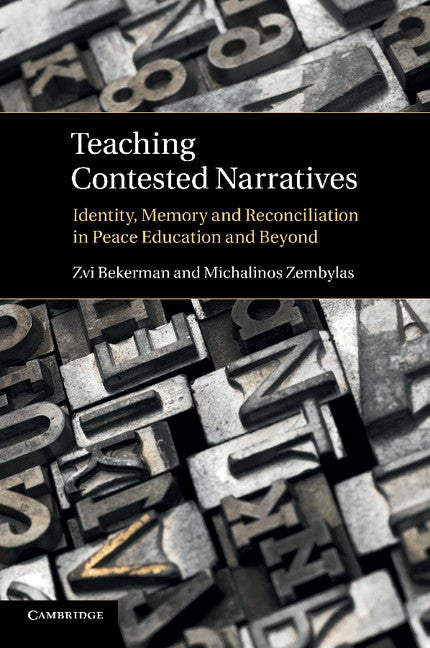Freshly Printed - allow 8 days lead
Couldn't load pickup availability
Teaching Contested Narratives
Identity, Memory and Reconciliation in Peace Education and Beyond
Reveals how the notions of identity, memory and reconciliation perpetuate or challenge attachments to essentialized ideas about peace and conflict.
Zvi Bekerman (Author), Michalinos Zembylas (Author)
9781107663770, Cambridge University Press
Paperback / softback, published 30 January 2014
272 pages
22.9 x 15.2 x 1.4 cm, 0.37 kg
'… a most compelling ethnographic comparative study of education that deals with issues of conflicting memories, identities and historical narratives in divided societies. It raises serious questions that challenge the prevailing psychologically oriented and Western-based epistemologies of peace education. Being written for both professionals and practitioners, it is a must read for anybody in the field of reconciliation, peace education and forgiveness.' Gabi Salomon, Professor Emeritus and Head of the Center for Research on Peace Education, Haifa University, Israel
In troubled societies narratives about the past tend to be partial and explain a conflict from narrow perspectives that justify the national self and condemn, exclude and devalue the 'enemy' and their narrative. Through a detailed analysis, Teaching Contested Narratives reveals the works of identity, historical narratives and memory as these are enacted in classroom dialogues, canonical texts and school ceremonies. Presenting ethnographic data from local contexts in Cyprus and Israel, and demonstrating the relevance to educational settings in countries which suffer from conflicts all over the world, the authors explore the challenges of teaching narratives about the past in such societies, discuss how historical trauma and suffering are dealt with in the context of teaching, and highlight the potential of pedagogical interventions for reconciliation. The book shows how the notions of identity, memory and reconciliation can perpetuate or challenge attachments to essentialized ideas about peace and conflict.
Part I. Introduction and Theoretical Underpinnings: 1. Introduction
2. Problematizing peace education romanticism
3. On conflict, identity and more
Part II. Living and Teaching Contested Narratives: 4. Victims and perpetrators: how teachers live with contested narratives
5. (Im)possible openings
6. The everyday challenges of teaching children from conflicting groups
7. The emotional complexities of teaching contested narratives
Part III. Mourning, Forgiveness and Reconciliation: Problems and Possible Solutions: 8. The nationalization of mourning in troubled societies
9. The work of mourning in schools: ambivalent emotions and the risks of seeking mutual respect and understanding
10. Forgiveness as a possible path towards reconciliation
Part IV. Conclusions: Implications for Peace Education: 11. Becoming critical design experts in schools
12. Memory and forgetting: a pedagogy of dangerous memories
13. De-essentializing identity
14. Designing different paths for reconciliation pedagogies.
Subject Areas: Nationalism [JPFN], Multicultural education [JNFR], Educational psychology [JNC], Social, group or collective psychology [JMH], Peace studies & conflict resolution [GTJ]


